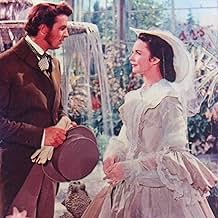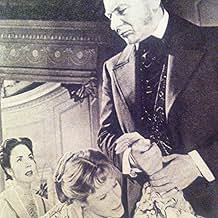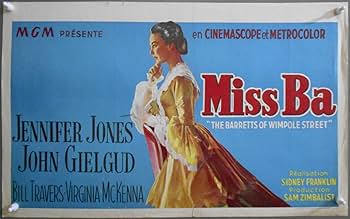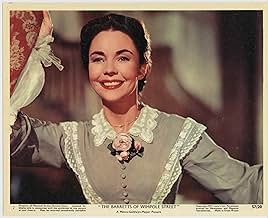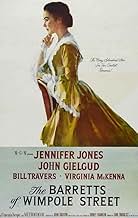IMDb RATING
6.5/10
621
YOUR RATING
Elizabeth Barrett's tyrannical father has forbidden any of his family to marry. Nevertheless, Elizabeth falls in love with the poet Robert Browning.Elizabeth Barrett's tyrannical father has forbidden any of his family to marry. Nevertheless, Elizabeth falls in love with the poet Robert Browning.Elizabeth Barrett's tyrannical father has forbidden any of his family to marry. Nevertheless, Elizabeth falls in love with the poet Robert Browning.
Christopher Cooke
- Minor Role
- (uncredited)
- Director
- Writers
- All cast & crew
- Production, box office & more at IMDbPro
Featured reviews
Although not as engaging as the original play, This film adaptation of BARRETTS OF WIMPOLE ST is a very well made film. John Gielgud gives one of his finest screen performances as Edward Barrett, he is despicable yet worthy of pity. Jennifer Jones is strong as Elizabeth and her character unfolds beautifully before your eyes. The actors who play the clan of brothers nicely delineate each role so they are individuals and not a unit. this film does suffer a bit from the over emphasis on the elizabeth/browning relationship as opposed to the father/daughter one but I suppose this was the hollywood trend toward romance at the time.
I've never seen the 1934 version, so I have nothing to compare with, but John Gielgud was sufficiently overbearing, cold, and creepy in the 1957 The Barretts of Wimpole Street for me to not even want to rent the original. There's an undercurrent of incest when he exerts control over his daughter, so it was probably a risk for him to take the role.
It was not a risk, however, for Jennifer Jones to take on Elizabeth Barrett. She's the queen of melodrama (the predecessor of Susan Hayward) and often has characters who get sick or die in her films. In this one, Jonesie is an invalid and meekly submits to all her father's wishes - until one day she meets the energetic, magnetic Robert Browning (played by Bill Travers). They write each other beautiful letters and fall in love, but she fears they can never overtake her father. It's a classic melodrama and shows off her great training as a heavy dramatic actress.
Young Virginia McKenna nearly steals the show as Jonesie's younger, fiery sister who occasionally has the guts to stand up to their father. They're both clad in beautiful period gowns, and Virginia has a fresh-faced sweetness mixed spunk that reminded me of Katharine Hepburn in Alice Adams. Plus it's really cute to see her act with her husband when they're not paired up as love interests. There aren't any Born Free sparks between them; it's called acting, and Virginia lets Bill romance her onscreen sister.
It was not a risk, however, for Jennifer Jones to take on Elizabeth Barrett. She's the queen of melodrama (the predecessor of Susan Hayward) and often has characters who get sick or die in her films. In this one, Jonesie is an invalid and meekly submits to all her father's wishes - until one day she meets the energetic, magnetic Robert Browning (played by Bill Travers). They write each other beautiful letters and fall in love, but she fears they can never overtake her father. It's a classic melodrama and shows off her great training as a heavy dramatic actress.
Young Virginia McKenna nearly steals the show as Jonesie's younger, fiery sister who occasionally has the guts to stand up to their father. They're both clad in beautiful period gowns, and Virginia has a fresh-faced sweetness mixed spunk that reminded me of Katharine Hepburn in Alice Adams. Plus it's really cute to see her act with her husband when they're not paired up as love interests. There aren't any Born Free sparks between them; it's called acting, and Virginia lets Bill romance her onscreen sister.
This version of The Barretts Of Wimpole Street lacks for nothing, it's certainly an improvement over the 1934 version in a technical sense with the wide screen and color. It even has the same musical theme that Herbert Stothart wrote for the earlier version that starred Norma Shearer, Fredric March and Charles Laughton.
Jennifer Jones was following in some mighty big footsteps in portraying Elizabeth Barrett. Not only Norma Shearer's, but Katherine Cornell who originated the role in the original Broadway production in 1931 which ran for 370 performances in those Depression years. That is something that should tell you more than anything else about how good this play is. Jen creates her own sense of intelligent regal beauty as the frail poetess who summons up the courage and strength to stand up to her tyrannical father.
Charles Laughton was widely quoted as saying that in his portrayal of the issue ridden Moulton Barrett, the censors couldn't censor the gleam in his eye to get past the Code. The Code by 1957 was cracking and John Gielgud used a couple of direct physical moves rather than camera closeups to show his incestuous feelings for his daughter. Gielgud still gives a fine account of himself, though Mr. Laughton set the standard for that role. On stage it was originated by Charles Waldron who moviegoers will best remember from his last part as General Sternwood in The Big Sleep.
Bill Travers plays a somewhat different Robert Browning than Brian Aherne on stage and Fredric March on the screen. Both of those men are refined types and Browning is a bit more boisterous in this film than he was in the previous one. Still he's ready to do right by Jones and take her from the tyranny she lives under.
Though the 1934 film is an MGM classic, none of the people associated with this version have anything to be ashamed about. This is a story that could be made today. I can see the casting already, Hugh Grant as Robert Browning, Kate Winslet as Elizabeth Barrett, and Tom Wilkinson as Moulton.
I'd pay for a ticket to that. Until then we have two very good classic screen versions.
Jennifer Jones was following in some mighty big footsteps in portraying Elizabeth Barrett. Not only Norma Shearer's, but Katherine Cornell who originated the role in the original Broadway production in 1931 which ran for 370 performances in those Depression years. That is something that should tell you more than anything else about how good this play is. Jen creates her own sense of intelligent regal beauty as the frail poetess who summons up the courage and strength to stand up to her tyrannical father.
Charles Laughton was widely quoted as saying that in his portrayal of the issue ridden Moulton Barrett, the censors couldn't censor the gleam in his eye to get past the Code. The Code by 1957 was cracking and John Gielgud used a couple of direct physical moves rather than camera closeups to show his incestuous feelings for his daughter. Gielgud still gives a fine account of himself, though Mr. Laughton set the standard for that role. On stage it was originated by Charles Waldron who moviegoers will best remember from his last part as General Sternwood in The Big Sleep.
Bill Travers plays a somewhat different Robert Browning than Brian Aherne on stage and Fredric March on the screen. Both of those men are refined types and Browning is a bit more boisterous in this film than he was in the previous one. Still he's ready to do right by Jones and take her from the tyranny she lives under.
Though the 1934 film is an MGM classic, none of the people associated with this version have anything to be ashamed about. This is a story that could be made today. I can see the casting already, Hugh Grant as Robert Browning, Kate Winslet as Elizabeth Barrett, and Tom Wilkinson as Moulton.
I'd pay for a ticket to that. Until then we have two very good classic screen versions.
Being owned by two English cocker spaniels my comments are a bit biased.
This film is intriguing, not just for the overall story but the way Flush, Elizabeth's cocker, was so much integral part of it. Given the 120 line poem that she wrote about Flush it was pleasing to see that Flush was very much a part of the movie.
Sir John Gielgud was a superb actor cast in the role of Elizabeth's tyrannical father. Jennifer Jones performance above par. And of course there was Flush. One very lucky cocker spaniel.
This film is intriguing, not just for the overall story but the way Flush, Elizabeth's cocker, was so much integral part of it. Given the 120 line poem that she wrote about Flush it was pleasing to see that Flush was very much a part of the movie.
Sir John Gielgud was a superb actor cast in the role of Elizabeth's tyrannical father. Jennifer Jones performance above par. And of course there was Flush. One very lucky cocker spaniel.
"The Barretts of Wimpole Street" (1957) is a word-for-word remake of the classic 1934 version by the same name. And, as such, I wonder why anyone should even bother seeing this film. After all, since the original version was a very nice and well-acted film (despite Charles Laughton overacting a bit), I can't see seeing a re-make--especially one that took almost no effort to make. Now I am not saying the 1957 film is bad--it is lovely to look at and the story is interesting. I just don't believe in rewarding studios for slap-dash remakes. In fact, unless the original film is seriously flawed and the remake corrects this, I can see no logical reason to see the remake and usually make it a habit to avoid them! So why did I watch the 1957 film? Well, I was flying cross-country and this film was one of the choices on the menu for in-flight films. And, in this sense, it fit the bill--and was pleasant but not particularly inspired.
Did you know
- TriviaBill Travers and Virginia McKenna got married in September 1957, after the January 1957 release of this film. Travers plays the role of poet Robert Browning, Elizabeth's love interest, and McKenna plays Henrietta, Elizabeth's younger sister.
- GoofsThe London pillar boxes weren't painted red (as seen) until 1874; before that, they were green.
- ConnectionsReferenced in Wogan: Episode #10.35 (1990)
- SoundtracksWilt Thou Have My Hand
Music by Herbert Stothart
[Elizabeth and all her siblings sing the song in her bedroom as she plays the piano; theme heard in the score throughout the movie]
Details
- Release date
- Countries of origin
- Language
- Also known as
- Miss Barrett
- Filming locations
- Marylebone Church, Marylebone, London, England, UK(wedding sequence)
- Production company
- See more company credits at IMDbPro
- Runtime
- 1h 45m(105 min)
- Aspect ratio
- 2.55 : 1
Contribute to this page
Suggest an edit or add missing content




